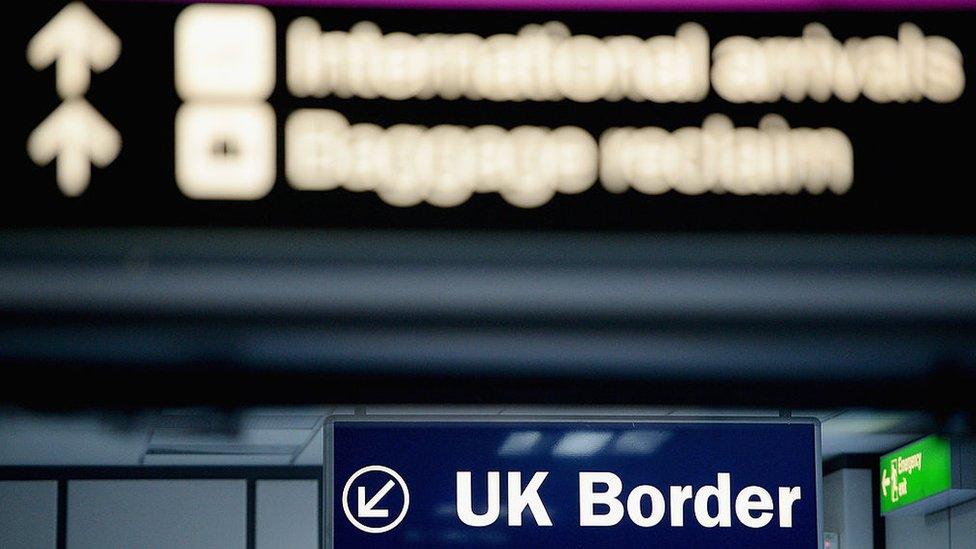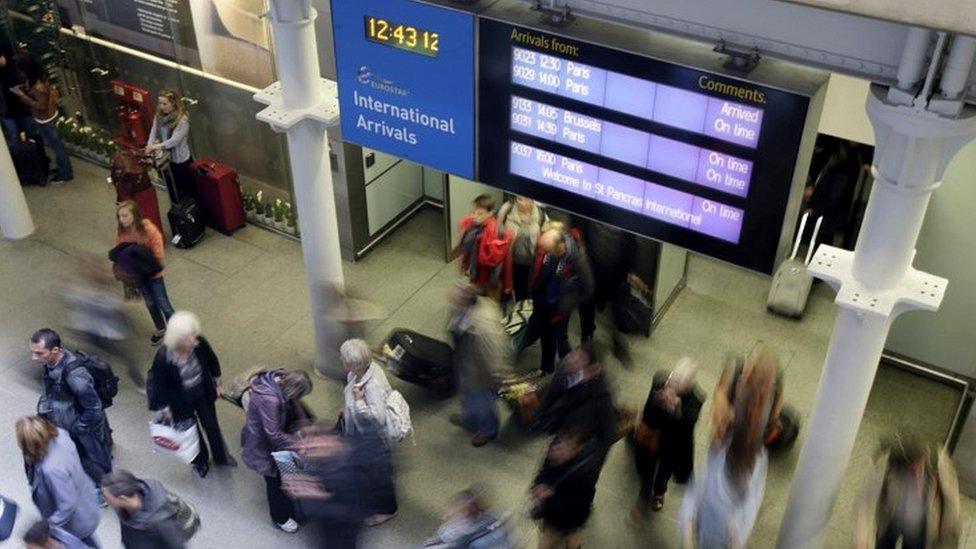Scrap 'tens of thousands' migration target, MPs urge
- Published

The government should drop its target of reducing net migration to the tens of thousands, a group of MPs has said.
Failure to meet it "undermines" public trust, the Home Affairs Committee argued,, external and instead, immigration policies should consider the UK's needs "and humanitarian obligations".
The MPs also said fears about the scale of illegal immigration have grown because of a lack of official data.
The Home Office said the public was clearly in favour of lower immigration.
Annual net migration to the UK is currently 230,000.
The target of reducing it to tens of thousands was set by David Cameron at the beginning of the coalition government in 2010, but that figure has never been met.
In its report, the Home Affairs Committee states that the target "is not working to build confidence" and does not reflect the public's view on how different forms of migration should be treated.
The continued "discrepancy" between the target and reality has "damaged" the public's view of the immigration system, they argue.
Home Affairs Committee chair Yvette Cooper calls for the migration target to be replaced
The report recommends the government switches to a Canada-style model - which is run on a points system - that uses evidence to come up with a "framework" of targets and controls for different types of immigration.
It also suggests:
Setting up an annual migration report, which details the economic contribution from migration, impacts, and actions on skills and integration
A greater focus on border enforcement, as well as criminal and security checks
More weight be given to high-skilled workers in the immigration system
The creation of a permanent resettlement programme for asylum seekers
It adds that foreign students, who are currently part of the UK's net migration statistics, should be removed from the target altogether.
To date, the government has resisted calls to take that step, despite arguments that the majority of students come to study and then return home - and make a significant positive economic contribution to the country.

Meanwhile, a separate report by think tank British Future and campaign group Hope not Hate, submitted to the committee, said high-profile failures in immigration policy had eroded public trust.
The report, titled National Conversation, interviewed public panels in more than 40 different towns and cities across the UK.
It cited the failure to deport foreign nationals at the end of their prison sentences as one of the problems raised by the panel members.
"A reason that many participants feel migration flows are uncontrolled is that they do not trust the government to enforce immigration policy," it added.
Theresa May: We still want to cut net migration to 'tens of thousands'
The Home Affairs Committee said the lack of data on illegal immigration was perceived as the government showing "indifference" towards an issue of "high public interest".
It urged ministers to produce an annual estimate of illegal immigration to reassure the public the issue was being taken seriously.
A Home Office spokesman said: "We are making it harder than ever before for those with no right to be here to remain in the UK.
"However, we also believe that more analysis of the scale and nature of the problem of illegal immigration is needed in order to develop appropriate policy responses and reassure the public that the issue is being addressed seriously."
The spokesman said net migration had fallen steadily "over the past four quarters" and added "the British people sent a very clear message in the EU referendum, they want more control of immigration and our borders."
- Published24 August 2017
- Published24 August 2017
